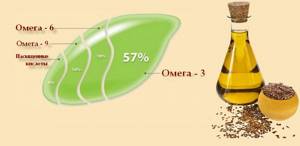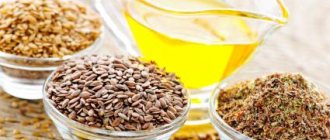Flaxseed oil for weight loss and more
Today, many people no longer remember this oil, although it used to be the pride of the agricultural industry.
So, flaxseed oil - what are its benefits? As already mentioned in the article about different types of oils, it contains a large amount of polyunsaturated fatty acids. Flax seed oil is an excellent external source of valuable polyunsaturated fatty acids Omega-3 and Omega-6, which is the essence of the benefits of this oil. These chemical compounds are good because they reduce cholesterol levels in our blood, increase the elasticity of blood vessels and prevent the development of myocardial infarction, atherosclerosis, hypertension, coronary heart disease, and reduce the risk of stroke and blood clots. In addition to Omega 3 and 6, it contains almost the entire B vitamin complex, vitamin E, which is a powerful antioxidant and growth factor. We can say that this is a storehouse of health and must be taken. It contains large quantities of substances necessary for the human body, such as protein, zinc, lecithin, potassium, magnesium, vitamins A, B, E and F. The oil not only helps you lose weight, but also improves the structure of hair, nails and skin.
Considering the benefits of flaxseed oil for hair, here are
several recipes for a hair mask :
1. For split ends.
Mix 150 ml of flaxseed oil and 100 g of chopped fresh burdock root. Leave the mixture to brew for 24 hours in a warm place. Next, boil in a water bath for 15-20 minutes, stirring. Apply the strained mixture of flaxseed oil and burdock root to your hair for 1-1.5 hours and rinse.
2. For brittle hair.
Prepare a mask in the proportion of 1 chicken egg yolk to 1 tbsp. a spoonful of warm flaxseed oil. Shake and apply to hair for 15-20 minutes. Rinse off with warm water.
3. For dry hair.
Mix 2 tablespoons of flaxseed oil with 1 tablespoon of lemon juice. Next, apply the resulting mask to your hair for 15-20 minutes and rinse with running water.
By making hair masks 2-4 times a month, in just a few months you will see results.
Speaking about
the benefits of oil for the skin, I would like to note that flaxseed oil softens and moisturizes the skin, restoring its elasticity and reducing wrinkles.
Flaxseed oil is indicated for use on dry skin: 1. Mask for aging skin
For aging skin, mix a tablespoon of crushed flax seeds with the same amount of milk powder and honey and add two tablespoons of water. Mix well and add one ampoule of vitamins A and C water in small portions.
2. Mask for dry skin
For dry skin with signs of flaking, this mask is ideal: grind an egg yolk with half a teaspoon of honey, add three to four drops of flaxseed oil and ten drops of lemon juice. Beat the mixture until foam forms and add a teaspoon of oatmeal ground in a coffee grinder.
3. Mask for oily skin
For oily skin and the T-zone of combination skin, the following mask is effective: mix a tablespoon of wheat flour with three tablespoons of kefir, a teaspoon of flaxseed oil, a small pinch of salt and two teaspoons of lemon juice. Mix the ingredients thoroughly. If the mass is too thick, it must be diluted with additional kefir. Apply the mask for fifteen minutes, then rinse it off with cool water. It perfectly eliminates oily shine, tightens enlarged pores, and is an excellent tonic.
Considering 3 oils (soybean, flaxseed, fish oil) from the point of view of the presence of Omega-3, polyunsaturated fatty acids so necessary for our body, we can say that:
1st place is occupied by linseed oil;
2nd place – fish oil;
3rd place - soybean oil.
The most important components of flaxseed oil are fatty acids:
— alpha-linolenic acid — 60% (Omega-3);
— linoleic acid — 20% (Omega-6);
— oleic acid — 10% (Omega-9);
— other saturated fatty acids — 10%.
It is worth noting that polyunsaturated fatty acids are a structural unit of cell membranes and especially cells and fibers of nervous tissue. That is, flaxseed oil is very useful and irreplaceable for both the heart and nerves. Those who regularly take flaxseed oil note increased resistance to stress, good spirits and mood. To do this, you need to take 1 tablespoon of oil daily on an empty stomach. Can be diluted with kefir or taken with a crust of black bread. Or you can simply add flaxseed oil to the salad.
Next, we will show you how to choose the right linseed oil .
When purchasing, you need to pay attention to the expiration date (since the product does not last forever), the color of the bottle should be dark so that light does not penetrate into the bottle. It is important that the oil be cold pressed, since during hot pressing the oil heats up greatly to 120 degrees and loses many of its qualities and is used in technical production.
How to properly store flaxseed oil.
Flaxseed oil must be stored in the refrigerator in the door (+5 - +9 degrees). The main thing is that it does not freeze and does not get exposed to light.
Contraindications for use
When taking any product, there is a downside. So, people with:
- Biliary tract problems;
- For diseases of the pancreas;
- For liver diseases;
- Flaxseed oil aggravates the course of hepatitis and pancreatitis.
Use this product with caution if you have hypertension. In the presence of cholecystitis, it is better to take the flax seed squeeze product with food. You should also stop taking it if you take combined oral contraceptives or sedatives. When starting a weight loss program using this product, be sure to consult your doctor. If he gives the go-ahead, still listen to your feelings. If there is obvious discomfort, it is better to choose another method of weight loss. The benefits of flaxseed oil for weight loss are obvious. This product gradually adjusts the body to losing weight without unnecessary stress, while the health of the person losing weight only improves. Not every diet has these benefits. Flaxseed can rightfully be considered a useful product in the fight against excess weight.
Flaxseed oil is rich in vitamins B, A, E, F, D, PP, as well as calcium, potassium, selenium, magnesium, zinc, manganese, sodium, phosphorus, iron and other minerals.
The calorie content of 1 tablespoon of flaxseed oil depends on the size of the cutlery. On average, one tablespoon contains 105 - 115 kcal of the product. Nutritionists do not recommend consuming more than 2 tablespoons of flaxseed oil per day.
Flaxseed oil: medicinal properties, benefits, harm, rules of use
Flaxseed oil occupies one of the first places in the ranking of vegetable fats due to its beneficial properties. It contains substances without which the body cannot function normally. The unique combination of healing ingredients contributes to the fact that more and more people who follow a healthy diet are starting to use flaxseed oil in their diet.
Doctors and cosmetologists use it to prepare healing products that help get rid of health problems and improve appearance. Adherents of a raw food diet especially revere flax extract and share recipes on how to make such a product at home - but it’s easier to go and buy it in a store. This will save time, and the benefits will be the same.
What do they promise?
Flax oil contains so-called omega-3 polyunsaturated fatty acids. If you believe those who suggest using it for weight loss, these substances are capable of:
- break down unnecessary fats into glycerin and water;
- cleanse of toxins (oh, these toxins, just like true love: everyone talks about it, but no one has seen it);
- accelerate fat burning;
- adjust your appetite.
However, not a single author describing the miracle remedy forgets to mention that it does not work without a diet, recommending no more than 1500 kcal per day. In the same way, it was not possible to find a single review in which the use of flaxseed oil alone made the figure slim. And no one indicates exact numbers, limiting themselves to the vague “put the intestines in order,” “tightened the tummy, removing excess water and all sorts of bad things.”
Composition of flax oil
Our ancestors began to use flaxseed oil from ancient times, without really thinking about why it was so useful. Nowadays, scientists have studied this valuable product and found that its healing qualities are due to:
- Vitamins (E, K, B, A, F, D, PP).
- Unsaturated fatty acids (half of which are Omega-3, the rest is equally divided by Omega-6 and Omega-9).
- Saturated fatty acids (palmitic, stearic - one tenth of flaxseed extract consists of these substances).
- Macroelements (phosphorus, calcium, potassium, magnesium, sodium, iron).
- Microelements (zinc, selenium, manganese).
- Sterols.
As with any plant product, flax seed extraction contains no cholesterol.
The chemical composition of flaxseed oil is unique in that the different components together form a useful product that affects the functioning of the entire body. Unsaturated fatty acids are especially useful - the human body cannot produce them and must take them from foods, but without them a full metabolism is impossible.

What makes flaxseed oil especially valuable is its composition of vitamins. Reproductive function and immune status are supported by vitamin E. It is also responsible for the smooth functioning of the body’s engine – the heart, and strengthens and makes blood vessels elastic.
Saturated fatty acids take part in thermoregulation - thanks to them, the body adapts to heat and cold. The maximum daily dose of these substances is up to 15 g. Anything more is already harmful.
Without phosphorus and calcium, it is impossible to “build” strong bone tissue and dental dentin (solid matter), and sterols are involved in biological processes and the structure of the cell membrane.
This product is available with various additives, such as selenium. Oil enriched with microelements and other substances is used purposefully to combat any problem, but it is used after consultation with a doctor.
The greatest benefit comes from unrefined flaxseed oil, which is obtained by cold pressing the seeds. In such a product, the medicinal properties of the product remain in their original form.
There is a distinction between white flax oil and black flax oil (although more precisely, brown). These extracts differ not only in color (white flax oil is lighter): the brown extract is richer in fatty acids, but it has a sharper characteristic taste. Using one of the two types is a matter of taste.

Where else can you get omega-3 acids?
First of all, from natural fish oil. They are also found in red fish (pink salmon, salmon, trout). But to replenish these reserves, you will have to eat more than 20-30 g of fish. And only 1-2 teaspoons (1 tsp = 5 g) of flaxseed oil are needed for the same purposes. Over time, you can increase the dose to a tablespoon (which is 17 g).
And now about the proportions. The consumption of Omega-6 and Omega-3 fatty acids should be in equal quantities, i.e. 1:1. But usually the body receives several times more Omega-6 than Omega-3, for example, 25:1. This imbalance often leads to unpleasant consequences. And it turns out that there seem to be practically no harmful (i.e. complex) fats in your diet, but you can’t lose weight. Flaxseed oil compensates for this deficiency and restores balance. This is what distinguishes it from other oils, in which the content of Omega-3 acids is much lower.
For comparison (quantity per 100 g of product):
- linseed oil 53.3 g;
- wheat germ oil 6.9 g;
- soybean oil 6.8 g;
- sprouted oat oil 1.4 g.
Calories and nutritional value
The caloric content of flaxseed extract is quite high - 898 kcal is contained in 100 grams of the product. As for nutritional value, we immediately remove carbohydrates and proteins from the BJU formula - they are not present in flax seed extract. But 99.8% fat.
These features of flax squeezing require a careful approach to its culinary use. Only moderate consumption will be correct, otherwise the benefits will turn into harmful consequences. Dietary nutrition involves small doses of flax juice added to fresh vegetable salads and cereal dishes - this is how the product brings the greatest benefit, and its components are completely absorbed.
To make it more convenient to count calories, you need to know how much flaxseed oil is in a tablespoon. This cutlery holds 16 g of product and, accordingly, about 110 kcal. Two tablespoons is the daily dose, according to the recommendations of nutritionists.
In cooking, there are debates about which is healthier, flaxseed oil or flaxseed. It all depends on the method of application, but in any case, the squeeze contains less unnecessary and more useful substances. And flax seed adds an original taste to salads, baked goods and other dishes, although the beneficial component is much smaller.

Beneficial features
What are the benefits of flaxseed oil:
- Significantly reduces the risk of heart attacks and strokes due to its anti-sclerotic properties: flax seed oil increases the concentration of beneficial lipoproteins in the blood and reduces the amount of harmful ones - the same ones that form plaques on the walls of blood vessels and contribute to the development of atherosclerosis.
- Fatty acids improve memory abilities and concentration by protecting neurons and communication between them. With aging, these properties of the nervous system decline, hence Alzheimer's disease and other age-related illnesses. In addition, psychiatrists and neurologists recommend consuming flaxseed oil regularly in small quantities to:
- Avoid depression.
- Increase stress resistance.
- Prevent the development of psychoneurological pathologies, for example, childhood attention deficit disorder.
Indications for use
What does flax seed extract treat:
- Diseases of the cardiovascular system.
- Diabetes.
- Disorders of the nervous system, including those caused by intense mental work and age-related.
Doctors recommend using flaxseed oil for medicinal purposes:
- If you are significantly overweight.
- Metabolic disorders.
This herbal product is an effective prevention of malignant neoplasms. This product is also useful for the skin - it is used for psoriasis, dermatitis, acne and other dermatological problems. If you are sunburned, apply flaxseed extract to your skin.

Why flaxseed oil is taken internally:
- From impotence.
- For symptomatic manifestations of menopause (sweating, irritability, dry mucous membranes).
- For constipation.
Eating flax extract is indicated as an adjuvant in the treatment of infertility, impotence and other reproductive disorders in women and men.
Contraindications and harm
Flaxseed oil is a herbal product, the benefits and harms of which largely depend on how to take it and in what quantities. But there are also direct contraindications, knowledge of which will protect you from possible unpleasant consequences.
Individual intolerance manifests itself most quickly. An allergic reaction manifests itself in different ways, from slight redness of the mucous membranes, runny nose and tears to Quincke's edema. At the first manifestations of allergies, you need to look for another vegetable oil for medicinal purposes - the same olive will do. Which oil is healthier, olive or flaxseed, in this case, is not the most important question.
To avoid side effects, do not take flaxseed oil while treating thrombosis with anticoagulants and antiplatelet agents (heparin, warfarin, aspirin, etc.). The herbal product enhances blood thinning, which can cause heavy bleeding, and in women of reproductive age cause heavy, prolonged menstruation.
In case of cholelithiasis and inflammation of the gallbladder, the choleretic effect of flax extract can cause the movement of stones through the bile ducts with their subsequent blockage. Inflammatory processes in the intestines and stomach (gastritis, enteritis, colitis, etc.) may become contraindications for ingesting this product.
Malignant tumors may show accelerated growth if the disease is caused by high concentrations of estrogen. Therefore, cancer patients can take flax oil only after talking with their doctor.
It is not recommended to use flaxseed oil for pregnant women and patients awaiting surgery. Pregnant women undergo hormonal changes throughout the body, and there is no point in adding flaxseed oil to the fire of this hormonal fire.
And it is completely unacceptable to use oil for any purpose, the quality of which is questionable, the product is expired or has deteriorated due to improper storage.
How to store it correctly
Since childhood, we have learned that the sun, air and water are our main friends. But with regard to flaxseed extract, these are the main enemies (with the possible exception of water - the oil extract does not mix with it). Ultraviolet radiation and air, storage in a warm, bright place in a poorly sealed container contribute to the oxidation of the product, the appearance of carcinogens and free radicals in it.
The best place to keep flax extract is in the refrigerator. Cool and dark. Choose glass dishes with a well-fitted lid. When purchasing, avoid plastic containers and clear glass. The best container is dark glass.
The extract must be used before the expiration date. If you don’t have time, throw it away, there is more harm in such a product than good.
Did you like the article? Like ♥, subscribe to our channel and you will be one of the first to know about new publications!
And if you have something to share, leave your comments! Your feedback is very important to us!
Properties of linseed oil
How much does linseed oil cost (average price for 1 liter)?
The beneficial and healing properties of flaxseed oil have been known since the time of the great Hippocrates, who used it as an analgesic and as a medicine for stomach diseases, burns and wounds. Ancient Egyptian beauties, having learned about the benefits of flaxseed oil, began to prepare creams and ointments with it, which miraculously took care of their skin and hair. And in Russia, flaxseed oil initially began to be consumed as food, much later discovering it as a cosmetic and medicinal product.
Currently, flax seed oil is consumed with pleasure - it takes pride of place on the tables of those people who monitor their health. The most convenient and easiest way to eat this product is considered to be the simple habit of dressing various salads with fresh vegetables, adding it to porridge, or simply sprinkling it on black bread. The calorie content of flaxseed oil is high and amounts to 898 kcal.
When purchasing oil, remember that it is best to buy it in small bottles. Don't forget to check the expiration date, as opened flaxseed oil will spoil very quickly. If you notice that the oil has thickened, clouded and become very bitter, throw it away without regret. By the way, it is not recommended to cook food with flaxseed oil, due to the fact that even with slight heating, everything useful in it dies.
Summarize
Flaxseed oil can be a valuable aid in the diet (whether it be), supplying the body with fat-soluble vitamins, prolonging the feeling of fullness, and normalizing bowel function, which is often difficult when there is a lack of food. However, when using it in nutrition, you need to remember that, like any fat, it is extremely high in calories. Under no circumstances should you consume a rancid or heat-treated product.
It is completely pointless to count on the fact that it will miraculously break down fat and remove the notorious toxins.
Flax contains the most Omega-3 acids, which are necessary for the brain, memory, vision, and heart. Flax relieves inflammation and improves mood.
Benefits of flaxseed oil
Among the most common diseases today are atherosclerosis and thrombosis. So, it is flaxseed oil that, by lowering cholesterol levels in the blood, reduces the risk of the occurrence and development of these diseases.
Prevention of cancer is also one of the possible beneficial properties of flaxseed oil, since it has the ability to normalize the metabolic process. The benefits of flaxseed oil in this case are due to the presence of lignans, that is, natural antioxidants that prevent cancer cells from dividing, thereby slowing down the growth of malignant tumors.
Flaxseed oil has found its use in the pharmaceutical and cosmetic industries, where emulsions, medicinal ointments, creams and soaps are made from it. And at home you can make nourishing masks with the addition of flaxseed oil, which will have a beneficial effect on your hair, face and body.
Application in cosmetology
In the pharmacy you can see a lot of exotic oils: shea, jojoba, cumin and many others. After reading reviews, we rush to buy expensive jars, forgetting that there is an original Russian oil, which leads among all others in its beneficial properties. Of course, we are talking about flaxseed oil.
The benefits and harms of the product taken internally have already been discussed above, but in cosmetology this is far from the last fiddle. It has the ability to significantly improve the condition of skin and hair, serves as an excellent basis for masks, but it can also be used as an independent product. To make your hair shiny and silky, you can apply linseed oil to it (at the roots and along the entire length) for 40-60 minutes, once or twice a week.
If you have dry skin on your face and hands, you can apply a thin layer of oil to your skin every evening to get rid of flaking. The only negative is the specific smell, which you can put up with.










